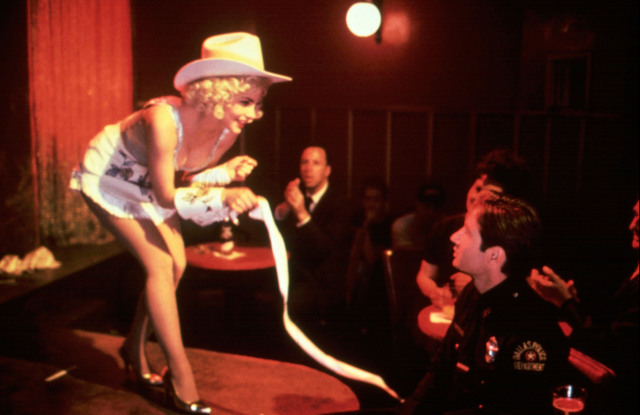
John Mackenzie’s film Ruby (1992) followed hot on the heels of Oliver Stone’s JFK (1991) but was even more liberal with the facts than Stone’s acclaimed picture. Ruby takes the basic information of the assassination and extrapolates a narrative wherein Jack Ruby (Danny Aiello) is a well-meaning two-time loser of a hood. Unlike JFK, Ruby has no pretensions about exposing the truth or spreading conspiracy theories. What Ruby as a film does is to take history and reduce it to its essentials to form the details in a character study.
Mackenzie’s Jack Ruby has more in common with Harold Shand than any historical figure. Jack Ruby may be named for a real person; be surrounded by characters named for real people; may even do some of the things that have been put on the historical record; but Mackenzie’s Jack Ruby is a fiction. The film Ruby makes more sense when one disregards its temporal proximity to JFK and view the film as a reprisal of the themes in The Long Good Friday (1980) as filtered through the histrionics of Goodfellas (1990).
Ruby is the portrait of a man whose fate has been wretched from his control by more powerful men. Jack Ruby believes in the American dream, the “good old days” in Chicago, and the code of honor of the mafia but it gets him nowhere. Ruby is a study of the machinations that control Ruby and his best dancer Candy Cane (Sherilyn Fenn) and the emotional fallout that accompanies their desperation. This desperate moment of truth is correlated to Ruby’s assassination of Oswald and his ensuing trial. In short, Ruby turns the life of Jack Ruby into a tragedy.
Mackenzie gets a great performance from Aiello and anchors a the entire film on the actor’s sympathetic “everyman” portrayal of Jack Ruby. The details, conspiracies, and manipulations that propel and/or stop Jack Ruby are kept intentionally muddled. Mackenzie wants to keep the viewer as disoriented and anxious as the titular lead; frantically grasping for some sort of control. History doesn’t matter in Ruby because it simply cannot matter in a story so immersed in the subjective experiences of a CIA patsy.
Ruby is a better film than JFK because it invites the viewer to accept the unknowing of history as a part of understanding the motives behind a single player involved in the case. JFK sprawls and gets lost in its messaging while Mackenzie constantly doubles down on the narrow focus of his film. JFK is a film so sure of itself that it endeavors to reinvent its genre. Ruby simply finds a genre by way of examining history. To Mackenzie the story of Jack Ruby read like a dime-store mafia yarn so he tells it that way, mining his own work in the crime film genre to do so. Ruby is a post-modern telling of history; JFK is history as post-modernism.
